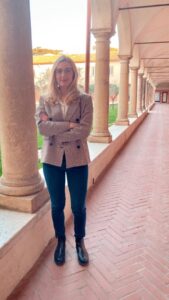Invited Plenary Speaker
Dr. Tobias Bernaisch
Justus Liebig University Giessen
“Genderlectal Variation in the Pragmatics of South Asian Englishes”
In the context of British colonisation, the English language took root in India at the beginning of the 17th century and has since become an integral linguistic force in South Asian countries. Despite political independence from the British around the 1950s, English continued to be used in South Asian countries not only because of its economic value but also because by then English had grown into a South Asian language with numerous nativised features unique to the Indian subcontinent.
As descriptions of these localised features have so far focused on sound systems, vocabulary and syntax , this talk offers empirical perspectives on routines of pragmatic discourse organisation and pragmatic action with a view to potential genderlectal variation as evident from the spoken parts of the British, Indian and Sri Lankan components of the International Corpus of English.
More specifically, pragmatic discourse organisation will be investigated with regard to speaker vs. hearer focus in statements, i.e. how often speakers employ references to themselves in comparison to references to their interlocutors, and pragmatic action will be studied with a focus on colloquial address terms such as dude, bro and localised forms like men or machang. Qualitative and quantitative pragmatic characteristics that emerge from the corpus data profile the individual South Asian Englishes as unique varieties of World Englishes notably different from their historical input variety British English.
Invited Workshop
Elena Mattei
Università di Verona
“How to perform systematic manual tagging of visual artifacts”
An interactive, data-driven workshop for the understanding and measurement of contemporary meaning-making practices
The main objective of this workshop is to introduce students to the theoretical and analytical skills of categorization and annotation in visual and multimodal static artifacts. By offering a practical tagging session and research-based examples which will be visualized on a newly developed software for manual annotation and statistical analysis, the students will have the opportunity to reflect upon the scientific validity of categorizing and labeling knowledge with data-driven, reproducible methods, and to practically apply their interpretation of theories by developing their own tagging model for the detection of visual features. At the end of the workshop, students will have gained a theoretical understanding of the reasons why knowledge structuring is crucial to scientific research; they will also learn how to carry out research projects independently by resorting to original but robust theoretical adjustments based on actual observation of data.
Website for workshop: http://xor.isti.cnr.it:8000/login.html
Contact: elena.mattei@univr.it
Schedule of Presentations
Sessions 10.30 – 11.50
SFG 1030
10.30 – 10.50: Jan Hensellek “‘Real or Fake?’ – A Corpus-Linguistic Investigation of Posting-Practices around Authenticity in Instagram ‘Reels’”
10.50 – 11.10: Sinead Middlemass-Dry “Multimodality in WhatsApp dialogues”
11.10 – 11.30: Ilona Kylmälä “Conceptualisation of Body Movements through Verbal Cues in Strength Sports”
11.30 – 11.50: Patrizia Bosello “A Corpus-based Critical Discourse Analysis of the representation of female business executives in the US media”
SFG 1040
10.30 – 10.50: Patrizia Bosello “Lexical creativity in the new age: An analysis of the “Words of the Year” between 2010 to 2021”
10.50 – 11.10: Cornelius Blank, Vera Schenck, and Lina Rohe “Representation and Perception of Mobile Signs in an Educational Environment.”
11.10 – 11.30: Polina Saveleva “The functions of laughter in interactional contexts”
11.30 – 11.50: Mohammed Gouriach “Language Imperialism“
Sessions 13.20 – 14.40
SFG 1030
13.20 – 13.40: Polina Saveleva “The conceptual metaphor SADNESS IS DOWN across the World English varieties”
13.40 – 14.00: Öykü Naz Gümüs “Conceptualization of SHAME in Nigerian and British English”
14.00 – 14.20: Tugba Aktürk “TIME IS MONEY metaphor in varieties of English”
14.20 – 14.40: Valeriia Bokhan-Cherepanova “Conceptualizations of LION in Varieties of English: A Corpus-based study of Kenyan and Tanzanian Englishes”
SFG 1040
13.20 – 13.40: Anna Cheban “TOEFL Skills and Strategies: the analysis of the most common problems and identifying the skills that should be developed to succeed in the exam.”
13.40 – 14.00: Pia Blanke and Pia Hovemann “Application of Language Learning Theories in the ESL Classroom”
14.00 – 14.20: Alexandra Rode “Learning in a fantasy world – An analysis of the Massively Multiplayer Online Role Playing Games (MMORPGs) “Final Fantasy 14” as an environment for SLA” (canceled)
14.20 – 14.40: Paul Hartjens “New Perspectives on the Aspect Hypothesis“
Sessions 15.00 – 16.30
SFG 1030
15.00 – 15.20: Lennart Robben “Yiddish loanwords in the United States”
15.20 – 15.40: Anika Lange and Benchamat Phueakdet “Multilingual Education in Singapore”
15.40 – 16.00: Selin Tümkaya, Anna Lucia Richter, and Dominik Ehlers “The effects of Multilingualism in early childhood”
SFG 1040
15.00 – 15.20: Lars Teller “How do societal changes affect the SLA experience?”
15.20 – 15.40: Lisa Elbieva, Hilperin Sican, and Selin Senem Yildiz “Does computer mediated communication in a second language affect the learning of this language”
15.40 – 16.00: Ha Phuong Nguyen, Alexandra Schweigerdt, Jana Schwind “Generation attitudes toward code switching, phenomenon”
